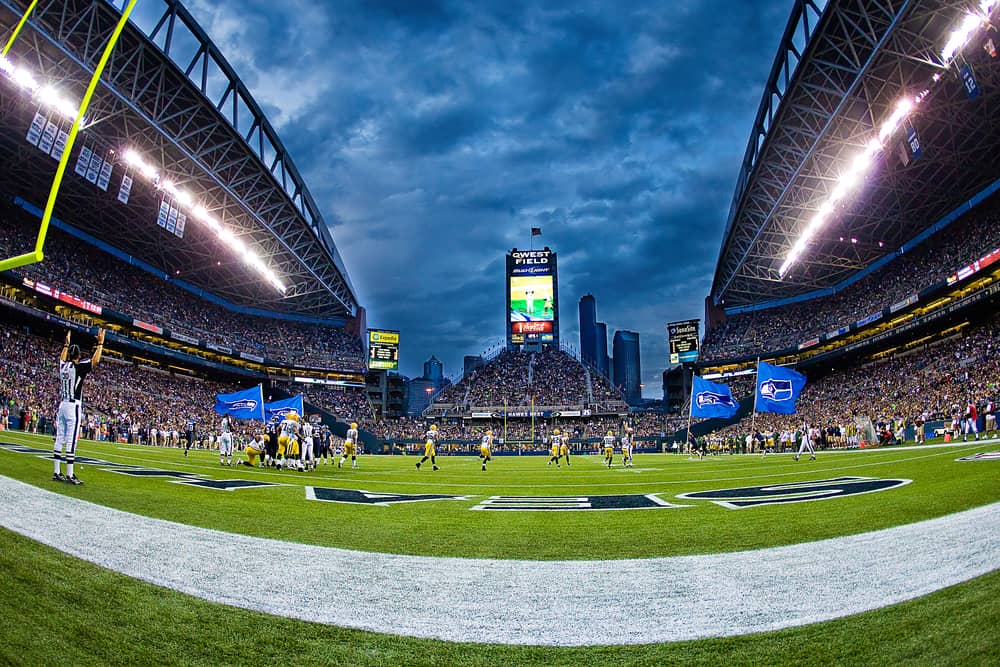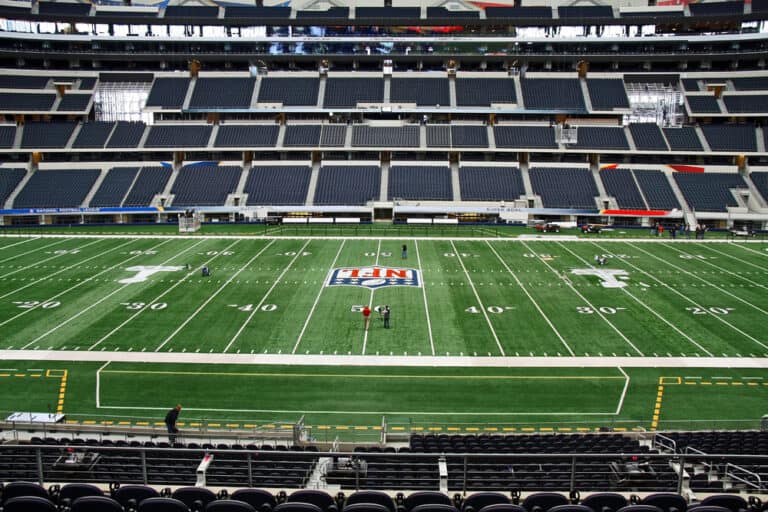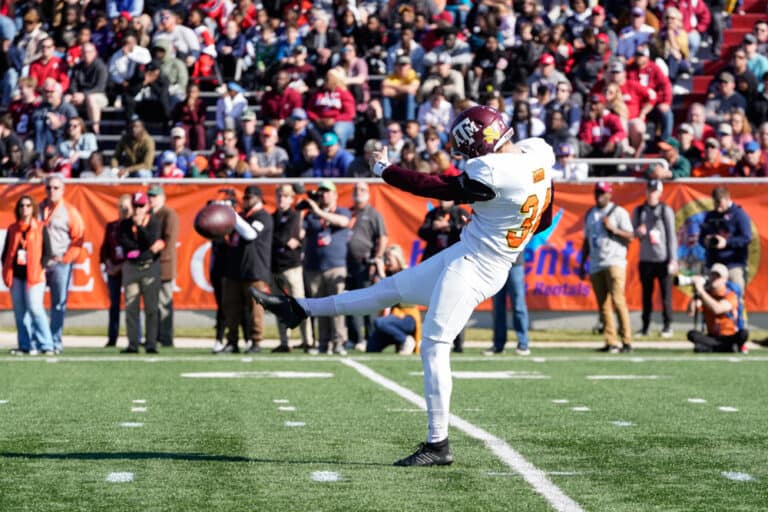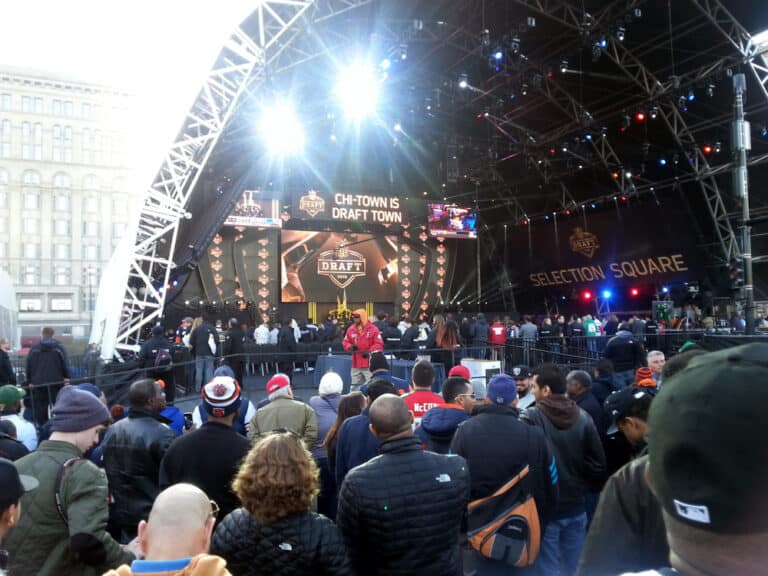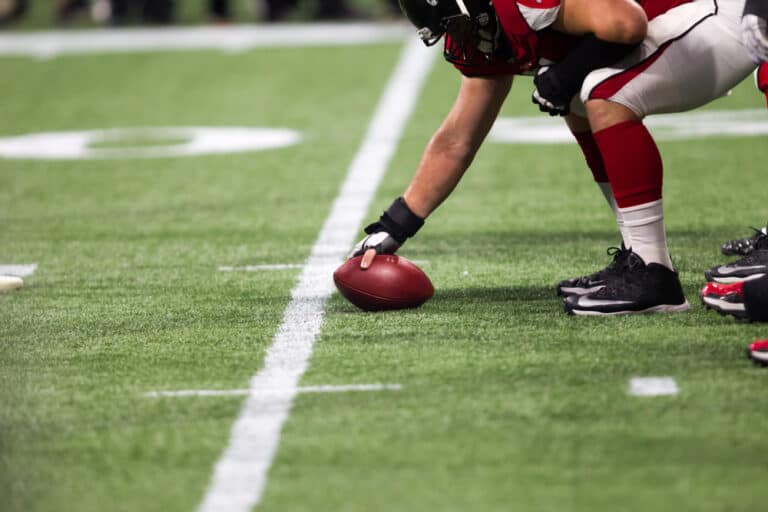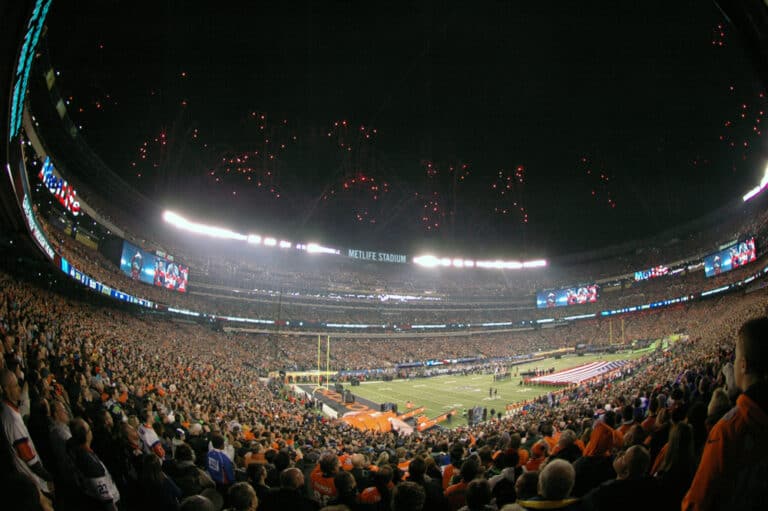Does A Field Goal Count If It Bounces? (All You Need To Know)
Editorial credit: MPH Photos / Shutterstock.com
Field goals are an integral part of football, and whether taken as an extra point after a touchdown or a three-pointer on third or fourth down, field goals offer teams the chance to add points and even win games – but does a field goal count if it bounces?
No, a field goal that either bounces before it crosses the crossbar or bounces off the crossbar and lands back in the field is considered a dead ball, and if the field goal were taken on a fourth down, the kicking team would forfeit possession.
Let’s tee it up and learn more about how field goals work, when they count and when they don’t, why a field goal wouldn’t count if it bounces, and the little known about dropkick field goals!
What Is A Field Goal In Football & Other Sports?
Kicking the ball through the uprights and over the crossbar is common in many similar sports worldwide, not only football.
Rugby and Aussie rules both have field goal-type plays, although they are not called field goals, but penalty kicks and dropkicks.
While these are named differently, the fundamental concept is the same: the kicker attempting to kick the football over the crossbar and through the uprights to score points.
In football and rugby, the penalty/dropkick/field goal is worth three points, while in football, the extra-point field goal is only a single point.
In football, the ball is snapped to the holder, who catches it and places it on the ground for the kicker to kick it and send it (hopefully) over the crossbar to either add an extra point or three points if it’s a field goal attempt.
What Is The Rule Definition Of A Field Goal In Football?
Under the rules of football, a field goal is defined as successful where the whole of the ball must pass between the uprights, or its inside edges and over the crossbar.
When Does A Field Goal Count As Good?
In football, the field goal is only counted as good when the ball sails over the crossbar between the uprights. If the ball goes under the crossbar or bounces infield, it is considered ‘no-good,’ and the ball is declared dead.
In football and rugby and its variations, the uprights extend infinitely upwards, so even if the ball goes way above the height of the uprights, it is still considered ‘good’ as long as it passes between them and over the crossbar.
If the ball strikes the crossbar, goes through the uprights to land in the end zone, or hits the netting, the field goal is good.
If the ball bounces off the inside of the uprights and still goes over the crossbar between the uprights, then the field goal is good.
Some kickers get the ball very high in the air, higher than the top of the uprights, but as long as the ball passes between them and over the crossbar, the field goal is good.
When Does A Field Goal Count As No Good?
The rules governing the legitimacy of a field goal are specific in football and quite similar in rugby. The ball must pass between the uprights without touching the ground first – if the ball bounces off the ground after being kicked and still somehow bounces over the crossbar, the ball is dead, and the goal does not count.
If the ball strikes the crossbar and bounces back into the field of play, it is declared dead, and the defending team gains possession.
If the field goal bounces off the upright and lands wide of the posts, it is missed to the left or right, and the field goal is no good.
If the ball bounces off the crossbar or uprights and lands out of bounds, the field goal is no good, and play resumes accordingly, depending on what down the field goal is taken on.
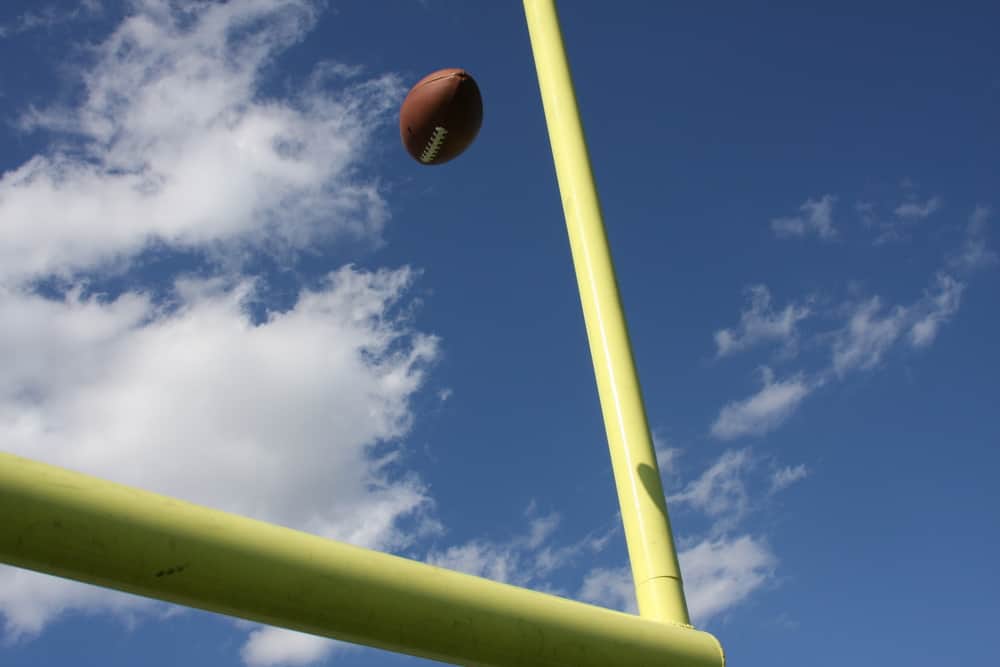
Is A Tipped Field Goal Ball Live?
If the ball is ‘tipped,’ which means it touches a defensive player after being kicked but still passes through the uprights and over the crossbar, the field goal is considered good.
If the ball is tipped and lands in the field of play, it is live and in play, and either team can recover it.
For example, the offense attempts a field goal on fourth down, and the ball is tipped and lands in play. If the offense can pick up the ball and run into the end zone, this will count as a touchdown.
However, if the offense has attempted the field goal on third down, and the ball is tipped, lands in the field of play, and is recovered by the crime but not taken into the end zone, the offense will get the fourth down where the play ends.
If the defense picks up the ball and runs it downfield, they will take possession wherever that play ends, or if it results in a touchdown, then the defense will have the opportunity to kick a field goal for the extra point.
Can A Kicker Drop Kick A Bouncing Ball After A Blocked Field Goal Attempt?
This one is a little tricky, as in week 14 of the 2022 season, between the Giants and the Eagles. The NY punter dropped the ball when attempting to kick it and then kicked after it had bounced.
Although this resulted in the Eagles getting possession in a good field position, it opened the discussion on the dropkick in the NFL.
The dropkick is where the kicker drops the ball intentionally and then kicks it after it bounces. This is a common kick in rugby and similar sports, but not so much in the NFL.
If the play is a field goal and the kicker uses a dropkick and kicks the ball over, the field goal would stand as the drop kick was made legally.
It is not illegal to dropkick the ball in football, but it is a rare occurrence. Where this would not be legal is where the field goal was blocked, and the kicker attempted the dropkick.
Under the rules, a ball that is blocked and lands in play is loose and is not permitted to be kicked by either team. This would be a foul for an illegal kick, carrying a 10-yard penalty.
Conclusion
A ball that bounces off the crossbar or in the field of play before going over the crossbar would not count, as it would not if the ball bounces off one of the uprights and lands back in the field or out of bounds. It would be declared a dead ball, and the game would proceed accordingly.
Resources
- https://www.rookieroad.com/football/penalties/illegal-kick-kicking-loose-ball/
- https://www.sportskeeda.com/nfl/nfl-drop-kick-field-goal-explained-what-works
- https://www.sportskeeda.com/nfl/news-what-field-goal-uprights-rule-nfl
- https://www.rookieroad.com/football/the-field/uprights/
- https://www.nydailynews.com/sports/football/kicker-drills-field-goal-bounce-blocked-article-1.3504313
- https://www.quora.com/In-American-football-if-a-field-goal-kick-attempt-goes-directly-over-the-upright-pole-is-it-counted-as-a-field-goals

